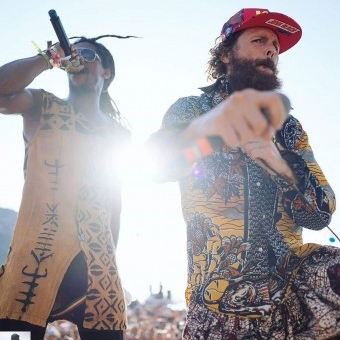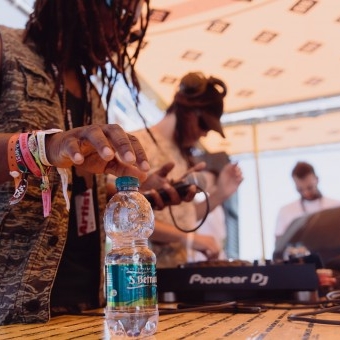How the system deceives the aspirant artists #1. Art VS Market | Music & Marketing
Data di pubblicazione 28/05/2019

How the market deceives the emergent artists
Part #1
Today's article is dedicated to all those who would like to become "artists", or at least would like to be recognized as such. To all who would like to give an artistic message with the own music, to all who would like to put down a marker because they have stories to tell. Arm yourself with a good beer, a cup of tea, or what you like the most and... enjoy reading!
Let's start with a presupposition. The artistic ideas are missing. It's not possible, in a world of about 200 millions of musicians, that all together produce more or less 50 musical genres and that at the inside of these genres there are always copies of copies of songs and formats which are already written (very often an entire genre comes from just one piece of music). Furthermore, every "musical genre" arises always from a record company which usually offers at least two (or three) similar artists or projects, and this means just one thing. It means that the musicians, to 99%, copy each other. And on average they do so in groups of 4 millions.
Thus, there is emerging a question: why do they do so? What persuades them to clone themselves?
Consequently we wrote up a second thought. In a world where are existing about 1 billion songs in commerce, and 1 billion persons only in the occidental market intent to buy / enjoy music, how is it possible that the songs in circulation are so few? Why do the radios still play songs that made success in '96 while it's practically impossible, for an aspirant, to get at these markets?
How is it possible that all the musicians of the world don't understand how it works now, even now that with the social networks they have the direct connection to the people? Is it really possible that everyone is in this system... without even noticing?
We decided to investigate and we found different answers that we want to share with you. Let's say that our thesis is that the musicians in a way are deceived by the system. We will try to explain this to you in this article segmented in 2 parts.
First part.
SEARCH FOR YOURSELF
FOLLOWING THE TREND THAT REPRESENTS YOU THE MOST

One of the reasons why an aspirant musician today renounces the art and dedicates himself to the clone (let's say that many aspirant artists have an attachment of a geneticist or a philologist more than of an artist) is the firepower of the entertainment system. The aspirant artists today feed the system in which the stars play without even noticing it because they are way to busy to search for two things: themselves on the one hand, and the public of an determined and good published project on the other hand.
Often we hear saying: I'm searching for "my" sound / the sound that I feel "mine". Millions and millions of artists, musicians, performers, singers, songwriters and DJ searching for themselves all the time, feed in fact a global market of billion euros and they do so by powerful narrations guided by other narrators, cloning the ideas of sounds and messages of ambitious multinational projects while they search for "themselves", for "the own sound", the own narration. A paradox? It is, but it's the reality. 99,9% of amateur artists in fact are integrated in a narrative system that glorifies them at the moment when they are participating in a determined trend... provided that the trend is big and fed. And this is all what is needed, for the ones that maintain dominant positions, to confirm them.
For who loves marketing and knows EDM music, it can be very interesting the case study of Spinnin' Records before it was bought up by Warner. We explain it to you, summarized: Spinnin' is a Dutch dance music label, it has ambitious projects in which it is investing much money, but it has been created an active audience that is pushing on aspirant artists to distribute that sound for free. How? By the use of a system called Talent Pooling, where aspirant producers could compete remixing successful songs of the label. In this way they created themselves an audience.
Now someone will wonder: but what do the audience and the (aspirant) musical producers have in common? Well... the aspirant DJ-producers ARE the audience of Spinnin'. With this device the Dutch group has distributed its sound on a global scale owing to millions of youths born from '95 to 2000 that passed the last 5 years producing music like the one of Spinnin' Records and distributing it with all might just to have a chance. They all were searching for the "own sound". Actually, it was the sound of Spinnin'. The brilliancy was that Spinnin' invested in a few projects (for example Martin Garrix) that were easy to reply musically. Today exist entire agencies who are selling sound libraries for making music like Spinnin'... and voilà, the game is up.
Dance music is an explicit world, self-sensational, so every case, including this one, becomes plausible. But where the mechanism is more implicit, like in other music genres like hip hop and rock, it gets even more interesting to analyze it. Because it happens that, besides the simple fact to clone a sound "because it works", the emotivity is aligning itself and sometimes the typical sacrality of hobby and amateur systems. Many aspirant artists think that the clone of a sound is got to be done not just because it "works", like it's happening in dance music, but that everything is connected at the artistic recipe! And this aspect is known very well by the managers of the big projects. For those who maintain the narration, it is quite comfortable, because there is a convenience. Whereas art is presupposing innovation and breach, where an artist is copying a sound, a method, a musical narration, he is cutting himself out of the competition, transforming himself in an active "follower" of a successful project, which in that moment becomes more convincingly, assuming artistic credibility.
It takes an idea or an artistic message for emerging, and in second place investing a lot. But the more of the aspirants aren't employed in creating an audience, but rather they are really accurate pronouncing to which stylistic family they belong to as users, users of the system, instead of giving a real and own message. Thinking to attract an audience.
Two specifications.
First, when we talk about specifying "to which family they belong to" we don't intend to say it explicitly, in a post on Facebook for example, but we mean adopting the rules that are subordinate to the musical creation. Briefly, the musician who wants the audience of Calcutta will never say "I'm cloning Calcutta", but he will be very accurate deducing and replying his musical format saying that he found "his own" sound.
In second place, let's specify that when we talk about successful projects we don't talk about the vanguard of the pop system, which generally are attractive for the big audience but not for the aspirant artists, instead we are talking about musical projects "slightly specific" and not too famous, because this ensures them a credibility of a genre, kind of an authenticity. Mainstream, okay ... but non strong enough to construct an autonomous brand. Anyway, a rapper will be very accurate traducing Fedez and praising Nitro. Because Fedez is carrying further the brand Fedez, he's already beyond the musical genres, a pop icon, like Jovanotti. However, Nitro isn't (yet) a brand and continues to be connectable at the family / brand "rap / hip hop".
The artistic message should be naturally unconventional, but the major part of these aspirant artists confuse "doing something that is artistic" with "maintain the existing artistic narration in working order". So, they copy. The aspirant artists today aren't occupied in changing the game rules, they are in there and they want to. There, in the game, they find their family, their audience (which is also creating the contents), their sound. And what's more, they aren't interested in changing any rule of the dominant narration, for a simple reason: the only thing they want from that narration is the audience. Is it a problem wanting to have a defined audience? No. The problem is another one.
The problem is that they don't notice that, inside the audience they are looking for, there are exactly themselves. And the market doesn't need a million of narrations: a few are enough, but with millions of followers.
.jpg)
These few narrations are the trends, the music genres and spearheads, that become the high-budget projects. On the market a few rules are sufficient, a few stars, but the narrations must be really powerful, enough to attract the attention of the super-users and in second place millions of consumers. The market is mobilizing all the strong points, and subsequently the user has to choose what he likes and what he doesn't like. Whatever is going to be chosen, the market wins (see all those that work without even being liked, for this very reason that no one likes them).
And the masterpiece arrives then, when these dominant narrations are fed by the aspirants of this role and just in second place by the audience.
Think about it: how much does the number of sold discs differentiate from the number of active music projects on the planet?
And how can the market convince the aspirant artists to renounce the challenge of art and to follow a narration that is written yet?
Very easy, it's the same like with the users of commercial services: it says that who makes part of a stylistic family, and therefore "searching for oneself" in a closed circle, is cool.
And it is at this point that the art, achievement of the expressive power except the personal preferences, dies.
The rapper who copies and publishes Nitro, the producer who copies and publishes Kygo, the clone band of Negramaro and Ex Otago. When the major part of aspirant artists doesn't search for art, but is looking for inserting itself in the world, in a genre or in a discographic context, they become super-users, respectively consumers and creators of similar contents that enrich dominant narrations, which become more and more powerful.
You won't believe it, but this is the reason why you say that nowadays artists don't exist anymore, even though Soundcloud has 100 millions subscribers... easy: 99% of the "artists" in reality aren't artists, but foremost they are super-user who feed the few "real artists".

















